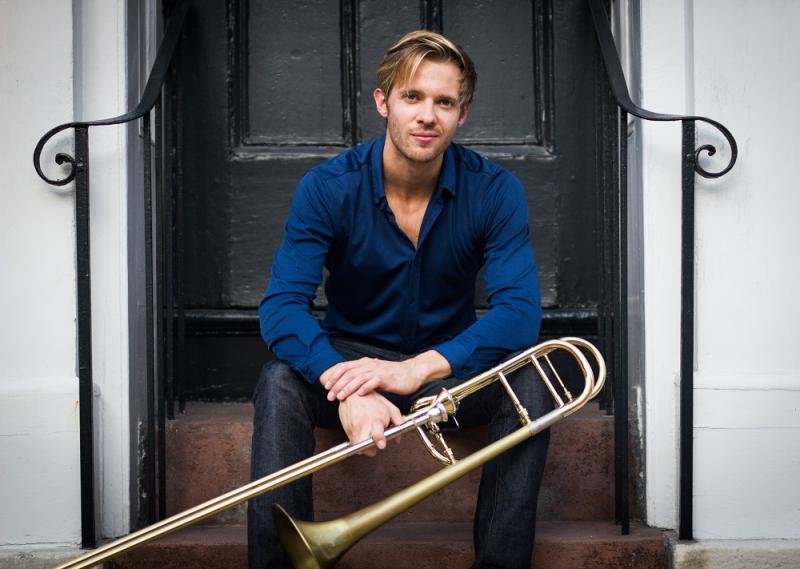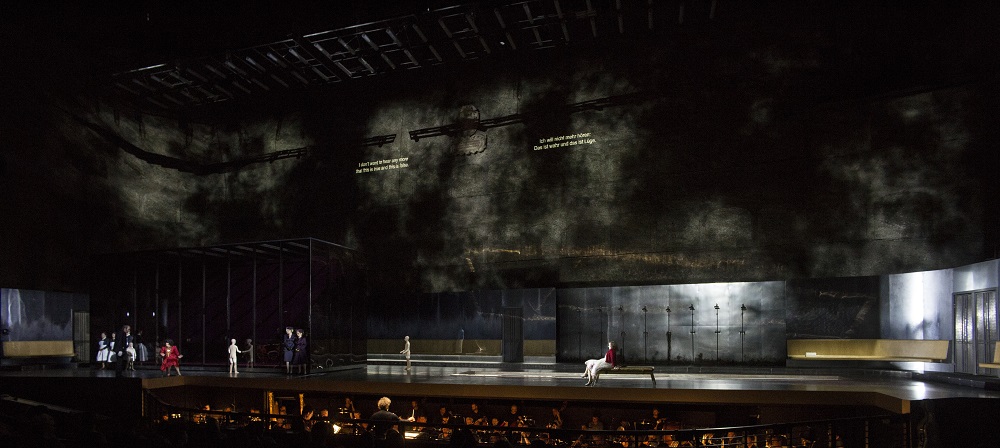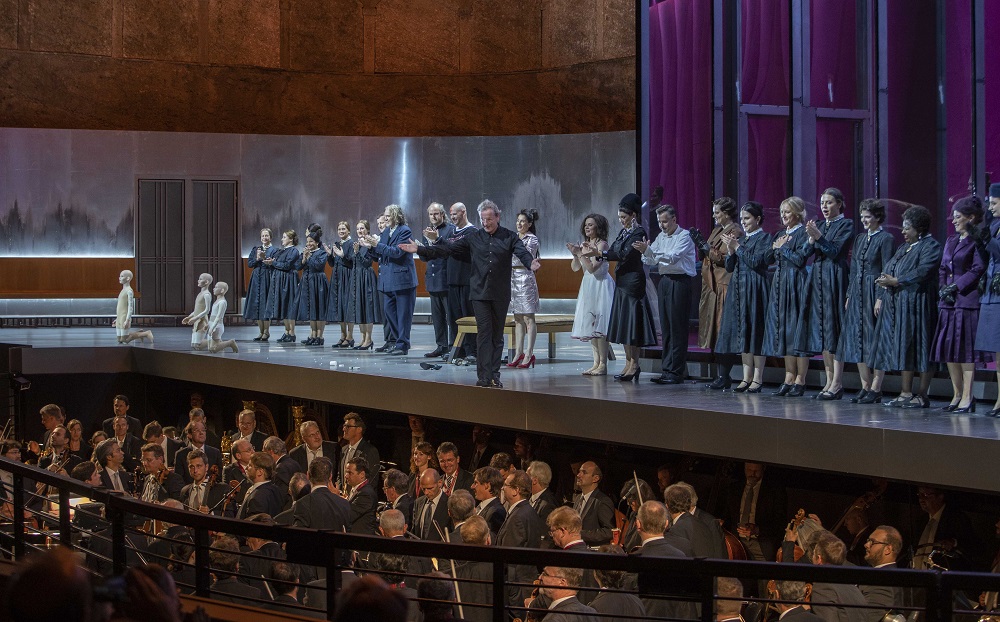'Rehearsing Beethoven with Barenboim felt like an historical moment': Vienna Philharmonic trombonist Kelton Koch on a new normal | reviews, news & interviews
'Rehearsing Beethoven with Barenboim felt like an historical moment': Vienna Philharmonic trombonist Kelton Koch on a new normal
'Rehearsing Beethoven with Barenboim felt like an historical moment': Vienna Philharmonic trombonist Kelton Koch on a new normal
As the Salzburg Festival flourishes, a Texan in Austria welcomes a musical rebirth

Joining the Vienna Philharmonic as a student and young professional was an absolute thrill. I had begun to play with the orchestra as an academist in October 2019 and as a full-time member in the Opera in January 2020. I was experiencing many “firsts”: concerts in the Musikverein [Vienna’s magnificent number one concert hall], first tour in Asia, first Vienna Philharmonic Ball and Vienna State Opera Ball.
Of course, it goes without saying that the pandemic has had much greater concerns and devastating effects than the mild challenges I have experienced over the past few months, so I speak only to give an example of a musician adapting to the circumstances over the past few months.
As clichéd as it is to say that music is a language and a form of communication, being stripped of performing with and for people has really highlighted how vital these aspects of music-making are. I enjoy the process of refining my musical product in isolation as much as anyone else, but when you strip away the end goal of performing for an audience, it’s difficult to have the same motivation in the practice room. Furthermore, it was actually quite difficult to find a proper practice acoustic to work effectively without disturbing neighbours. [Pictured below by Bernd Uhlig: Franz Welser-Möst conducts the Vienna Philharmonic in this year's Salzburg Festival production of Strauss's Elektra]  Because I am hoping to play my whole career in Vienna, I often consider the fact that I should really cherish the rare opportunities for me to visit my family. It was a bit unfortunate to not be able to travel and to utilize these quarantined months to be at home with my family. Not only would it have been more enjoyable to be with other people in the quarantine, but it would have been one of the best chances to be with my parents again for an extended period of time.
Because I am hoping to play my whole career in Vienna, I often consider the fact that I should really cherish the rare opportunities for me to visit my family. It was a bit unfortunate to not be able to travel and to utilize these quarantined months to be at home with my family. Not only would it have been more enjoyable to be with other people in the quarantine, but it would have been one of the best chances to be with my parents again for an extended period of time.
Thankfully, the time in strict quarantine didn’t last too long. I’m extremely grateful that Austria aggressively lifted the quarantine and restrictions as fast as possible in a responsible, intelligent way. Furthermore, I was really happy that the Vienna Philharmonic was committed to playing again as long as it could be done safely. It led the way with a study investigating the risks of performing, particularly with regards to airflow in wind instrument playing. With these promising results and the lowered spread of COVID-19 in Austria, it was possible to begin playing concerts in June. [Pictured below by Marco Borrelli: Elektra "curtain call"]  Of course, many precautions were taken, including weekly tests before each concert cycle and the wearing of masks backstage. There was definitely a feeling of excitement to see colleagues after being separated for three months, and the first rehearsal of Beethoven’s Fifth Symphony with Daniel Barenboim felt like an historical moment. Only a hundred people could attend the concert due to safety concerns, mostly on free tickets given out to friends and family. Obviously, these concerts weren’t particularly financially advantageous, but there was a sense of importance in bringing back art and culture into Austria. In doing so, I believe the Vienna Philharmonic showed that it values forward-thinking as much as its globally-heralded musical tradition.
Of course, many precautions were taken, including weekly tests before each concert cycle and the wearing of masks backstage. There was definitely a feeling of excitement to see colleagues after being separated for three months, and the first rehearsal of Beethoven’s Fifth Symphony with Daniel Barenboim felt like an historical moment. Only a hundred people could attend the concert due to safety concerns, mostly on free tickets given out to friends and family. Obviously, these concerts weren’t particularly financially advantageous, but there was a sense of importance in bringing back art and culture into Austria. In doing so, I believe the Vienna Philharmonic showed that it values forward-thinking as much as its globally-heralded musical tradition.
Andris Nelsons, the conductor of the 2020 New Year’s concert, has often described music as “food for the soul”. This pandemic was a reminder for how true this statement is. Moreover, it demonstrated to me that music is truly a communicative artform that is meant to be made with and for others. While I can’t exactly say I’m thankful for the experience of the past few months, I’ve certainly gained a new appreciation for the importance of togetherness, living life in the real world and not on screens, and an appreciation for what I do.
- Review of the Salzburg Elektra on theartsdesk tomorrow
- Full details of this year's Salzburg Festival
- More classical music reviews on theartsdesk
Share this article
The future of Arts Journalism
You can stop theartsdesk.com closing!
We urgently need financing to survive. Our fundraising drive has thus far raised £49,000 but we need to reach £100,000 or we will be forced to close. Please contribute here: https://gofund.me/c3f6033d
And if you can forward this information to anyone who might assist, we’d be grateful.

Subscribe to theartsdesk.com
Thank you for continuing to read our work on theartsdesk.com. For unlimited access to every article in its entirety, including our archive of more than 15,000 pieces, we're asking for £5 per month or £40 per year. We feel it's a very good deal, and hope you do too.
To take a subscription now simply click here.
And if you're looking for that extra gift for a friend or family member, why not treat them to a theartsdesk.com gift subscription?
more Classical music
 Bizet in 150th anniversary year: rich and rare French offerings from Palazzetto Bru Zane
Specialists in French romantic music unveil a treasure trove both live and on disc
Bizet in 150th anniversary year: rich and rare French offerings from Palazzetto Bru Zane
Specialists in French romantic music unveil a treasure trove both live and on disc
 Scottish Chamber Orchestra, Ibragimova, Queen’s Hall, Edinburgh review - rarities, novelties and drumrolls
A pity the SCO didn't pick a better showcase for a shining guest artist
Scottish Chamber Orchestra, Ibragimova, Queen’s Hall, Edinburgh review - rarities, novelties and drumrolls
A pity the SCO didn't pick a better showcase for a shining guest artist
 Kilsby, Parkes, Sinfonia of London, Wilson, Barbican review - string things zing and sing in expert hands
British masterpieces for strings plus other-worldly tenor and horn - and a muscular rarity
Kilsby, Parkes, Sinfonia of London, Wilson, Barbican review - string things zing and sing in expert hands
British masterpieces for strings plus other-worldly tenor and horn - and a muscular rarity
 From Historical to Hip-Hop, Classically Black Music Festival, Kings Place review - a cluster of impressive stars for the future
From quasi-Mozartian elegance to the gritty humour of a kitchen inspection
From Historical to Hip-Hop, Classically Black Music Festival, Kings Place review - a cluster of impressive stars for the future
From quasi-Mozartian elegance to the gritty humour of a kitchen inspection
 Shibe, LSO, Adès, Barbican review - gaudy and glorious new music alongside serene Sibelius
Adès’s passion makes persuasive case for the music he loves, both new and old
Shibe, LSO, Adès, Barbican review - gaudy and glorious new music alongside serene Sibelius
Adès’s passion makes persuasive case for the music he loves, both new and old
 Anja Mittermüller, Richard Fu, Wigmore Hall review - a glorious hall debut
The Austrian mezzo shines - at the age of 22
Anja Mittermüller, Richard Fu, Wigmore Hall review - a glorious hall debut
The Austrian mezzo shines - at the age of 22
 First Person: clarinettist Oliver Pashley on the new horizons of The Hermes Experiment's latest album
Compositions by members of this unusual quartet feature for the first time
First Person: clarinettist Oliver Pashley on the new horizons of The Hermes Experiment's latest album
Compositions by members of this unusual quartet feature for the first time
 Gesualdo Passione, Les Arts Florissants, Amala Dior Company, Barbican review - inspired collaboration excavates the music's humanity
At times it was like watching an anarchic religious procession
Gesualdo Passione, Les Arts Florissants, Amala Dior Company, Barbican review - inspired collaboration excavates the music's humanity
At times it was like watching an anarchic religious procession
 Classical CDs: Camels, concrete and cabaret
An influential American composer's 90th birthday box, plus British piano concertos and a father-and-son duo
Classical CDs: Camels, concrete and cabaret
An influential American composer's 90th birthday box, plus British piano concertos and a father-and-son duo
 Cockerham, Manchester Camerata, Sheen, Martin Harris Centre, Manchester review - re-enacting the dawn of modernism
Two UK premieres added to three miniatures from a seminal event of January 1914
Cockerham, Manchester Camerata, Sheen, Martin Harris Centre, Manchester review - re-enacting the dawn of modernism
Two UK premieres added to three miniatures from a seminal event of January 1914
 Kempf, Brno Philharmonic, Davies, Bridgewater Hall, Manchester review - European tradition meets American jazz
Bouncing Czechs enjoy their Gershwin and Brubeck alongside Janáček and Dvořák
Kempf, Brno Philharmonic, Davies, Bridgewater Hall, Manchester review - European tradition meets American jazz
Bouncing Czechs enjoy their Gershwin and Brubeck alongside Janáček and Dvořák
 Solomon, OAE, Butt, QEH review - daft Biblical whitewashing with great choruses
Even a top soprano and mezzo can’t make this Handel paean wholly convincing
Solomon, OAE, Butt, QEH review - daft Biblical whitewashing with great choruses
Even a top soprano and mezzo can’t make this Handel paean wholly convincing

Add comment